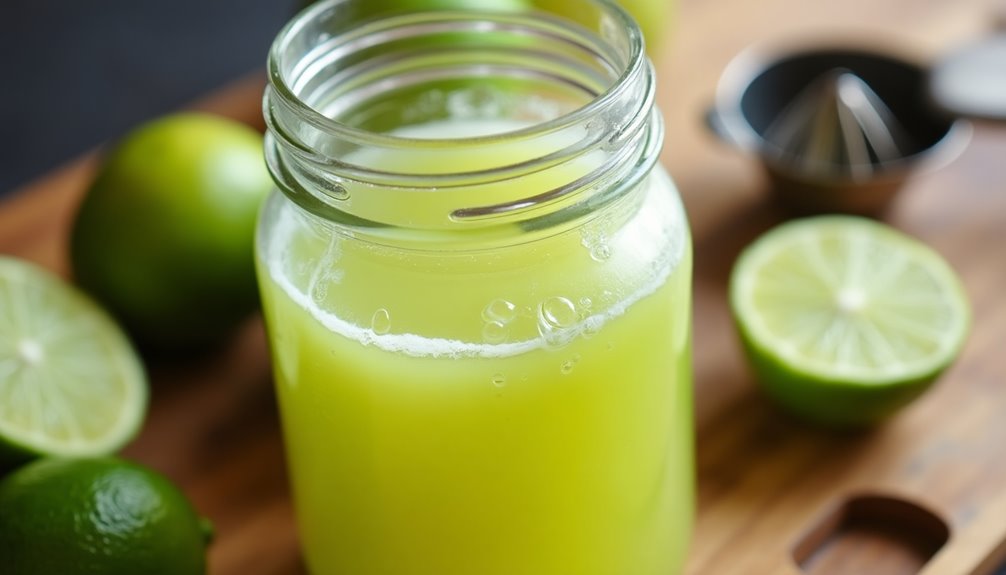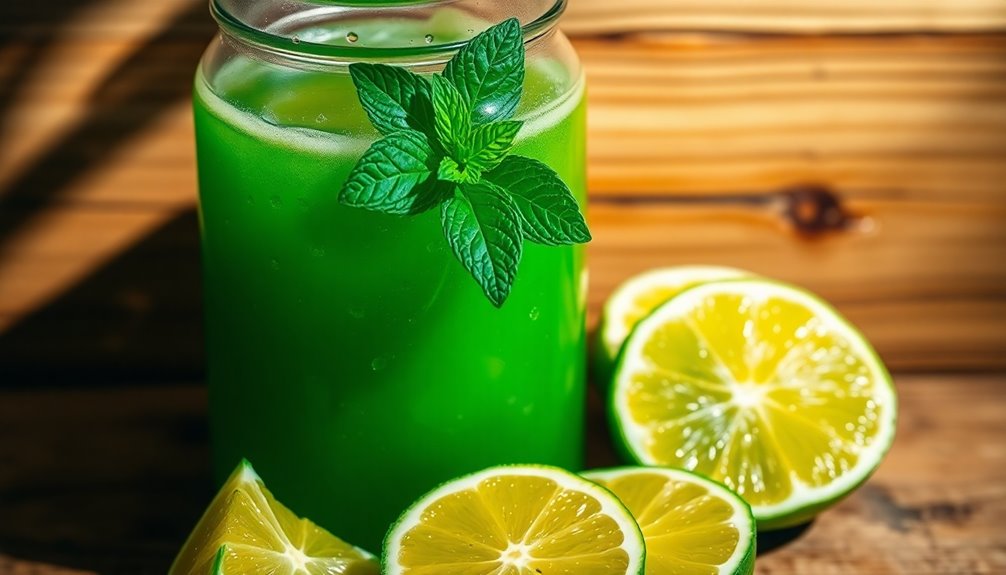Fresh lime juice lasts about 2-3 days in the fridge when stored in an airtight container. If you notice any off odors, unusual flavors, or mold, it's time to toss it out. Consuming spoiled juice can lead to food poisoning, so always check before using. For longer storage, consider freezing it in ice cube trays. Want to know how to make the most out of your fresh lime juice? There's more to explore!
Key Takeaways
- Fresh lime juice can last in the fridge for about 2-3 days when stored properly in an airtight container.
- Signs of spoilage include off odors, unusual flavors, or the presence of mold.
- Consuming spoiled lime juice poses a risk of food poisoning, so always check before use.
- For extended storage, fresh lime juice can be frozen for 3-4 months without losing quality.
- Freshly squeezed lime juice retains a unique flavor that is superior to store-bought options.

When you squeeze fresh lime juice, you want to enjoy its vibrant flavor at its peak, but how long can you keep it in the fridge? The answer depends on a few factors, including how you store it and whether you've used store-bought juice or freshly squeezed juice. Fresh lime juice offers a unique zest that can elevate any dish or drink, but it doesn't have the same shelf life as its bottled counterparts.
After squeezing your fresh lime juice, it's best to use it right away, ideally within 24 hours. This ensures you capture the maximum flavor and aroma. However, if you need to store it, placing the juice in an airtight container is crucial. In the refrigerator, fresh lime juice can last about 2-3 days. After this period, you may start noticing signs of spoilage. If it develops off odors, unusual flavors, or even mold, it's time to toss it out. Consuming spoiled juice can lead to food poisoning, which is definitely something you want to avoid.
If you're looking to extend the life of your fresh lime juice, consider freezing it. Freezing is a great option, allowing you to preserve the juice for up to 3-4 months without sacrificing its taste. Just pour the juice into ice cube trays or small airtight containers, and you'll have perfectly portioned lime juice ready for your next culinary adventure. When you need some zest, simply thaw out a cube and enjoy the freshness that's been preserved.
While store-bought juice might've a longer expiration date, it often contains preservatives that alter the taste. If you're trying to capture the true essence of lime, nothing beats freshly squeezed juice. But keep in mind that even store-bought juice can spoil once opened, usually within a week or two, depending on its ingredients. Always check the expiration date to ensure you're consuming it safely.
Storing your lime juice properly is essential for maintaining its quality. If you notice any changes in flavor or smell, it's best not to take any risks. Spoiled lime juice can ruin a dish or drink and may lead to health concerns.
Frequently Asked Questions
Does Lime Juice Go Bad in the Fridge?
Yes, lime juice can go bad in the fridge. If you store it improperly, it might develop off odors or unusual flavors within a day.
To keep it fresh, always use an airtight container and limit its exposure to air and light.
Check for signs of spoilage like mold or strange smells before using it. If it doesn't smell or taste right, it's best to toss it out for safety.
How Long Is Homemade Lime Juice Good For?
Homemade lime juice is good for about 2-3 days when you store it in an airtight container.
You'll notice the flavor can start to fade within just 24 hours, so it's best to use it quickly for the best taste.
If you want to keep it longer, consider freezing it.
This way, you can enjoy the fresh taste for up to 4 months without worrying about it going bad.
How Do You Preserve Fresh Lime Juice?
They say, "A stitch in time saves nine."
To preserve fresh lime juice, start by transferring it to an airtight container right after juicing. This minimizes oxidation and keeps it fresh.
If you’re storing it in the fridge, it’ll last about 2-3 days. For longer preservation, freeze the juice in ice cube trays or airtight containers; it can last up to four months. To maximize the freshness and flavor of your beet juice, it’s important to pay attention to how you store it. Make sure to label your containers with the date so you can easily keep track of its age. For those seeking tips on how to store beet juice efficiently, consider using vacuum sealers to remove excess air, which can help further extend its shelf life in the freezer.
Just remember to label your containers with the date!
How Long Does Fresh Squeezed Lemon and Lime Juice Last?
When it comes to fresh-squeezed lemon and lime juice, you'll find that both have a short shelf life.
Generally, lemon juice lasts about 1-4 days, while lime juice stays fresh for around 2-3 days in the fridge.
To keep their flavors intact, it's best to use them within 24 hours.
Storing them in airtight containers and minimizing exposure to air and light can help maintain their quality for a bit longer.
Conclusion
In the vibrant world of fresh lime juice, it's best to savor its zesty goodness within a week when stored in the fridge. Picture that bright green liquid, bursting with citrusy flavor, slowly losing its sparkle after just a few days. To keep that refreshing taste alive, consider sealing it tight in an airtight container. So, the next time you squeeze those limes, remember to enjoy the tangy delight while it's still fresh and lively!
Cindy thoroughly researches juicing trends, techniques, and recipes to provide readers with practical advice and inspiration. Her writing style is accessible, engaging, and designed to make complex concepts easy to understand. Cindy’s dedication to promoting the advantages of juicing shines through her work, empowering readers to make positive changes in their lives through the simple act of juicing.











